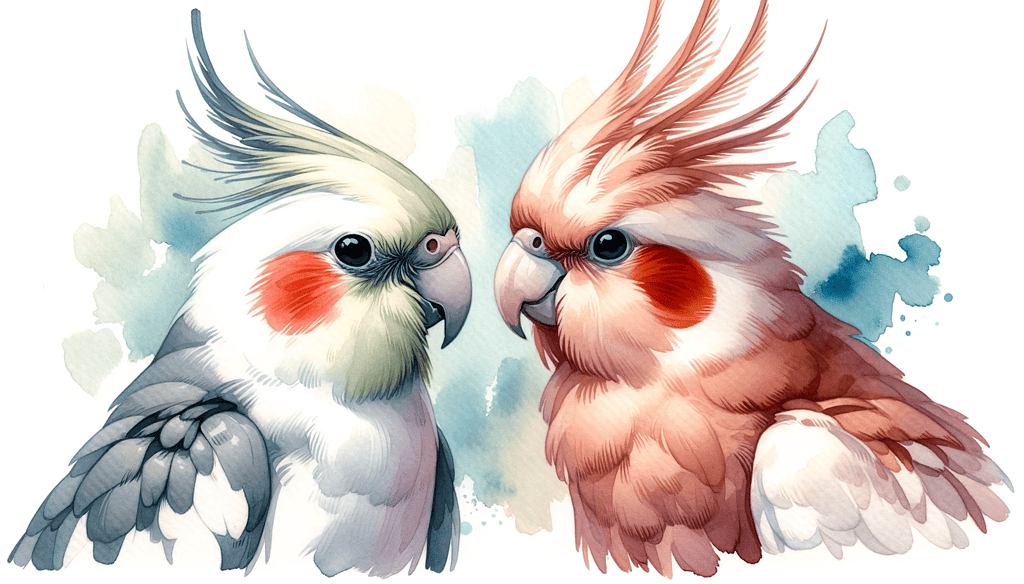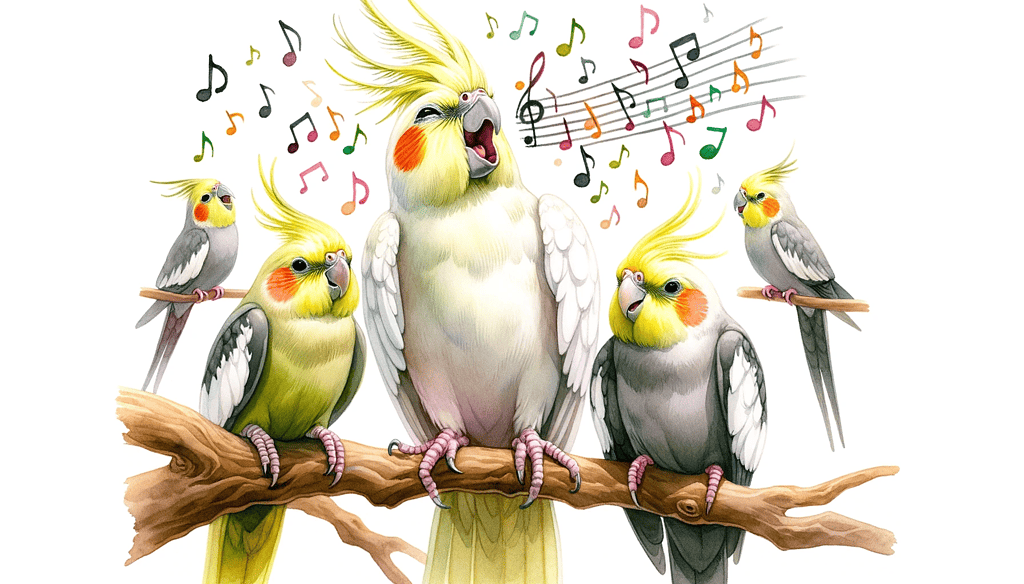
Cockatiels, with their playful demeanor and expressive crests, easily flutter their way into our hearts. However, beneath those charming tufts and chirpy tunes, lies a spectrum of emotions that can sometimes veer towards the green-eyed monster – jealousy. The emotional depth of these feathered companions is as captivating as their melodies, but when jealousy takes flight, it can ripple through their behavior and the harmony of your household.
As a general rule, cockatiels are known to exhibit signs of jealousy when they feel threatened by new members in their environment or sense a shift in attention. This can manifest in various behaviors such as aggression, excessive vocalization, or even self-mutilation.
Ready to unravel the jealous streak of your feathery friend? Glide through the article to unveil the heart-fluttering intricacies of cockatiel emotions.
When Do Cockatiels Get Jealous?
Cockatiels can feel the pangs of jealousy, especially when they see their beloved human paying attention to others. This intricate emotion gets a tad more pronounced with the introduction of new pets or individuals into their known environment. Let’s delve into what triggers this green-eyed monster in cockatiels:
- Introduction of New Members: Be it a new pet or a human, cockatiels can exhibit jealousy towards the new entrants vying for your attention.
- Alteration in Environment: Changes like rearrangement of furniture can distress your cockatiel, igniting jealousy.
- Insecurity: Past neglect or abrupt changes might lead to insecurity, fueling jealousy.
- Monogamy: Some cockatiels form a monogamous bond with one person or pet, making them jealous of others intruding on this bond.
- Threat to Position: Any perceived threat to their position can trigger jealousy in cockatiels.
5 Signs of Jealousy in Cockatiels
Observing our birds, we can notice distinct behavioral changes indicating jealousy. Here’s a comparative glance at how cockatiels exhibit jealousy vis-a-vis other pet birds:
1. Excessive Screaming

The vocal expression of jealousy in cockatiels is something you can hardly overlook, especially when new faces are introduced into their environment. Their screams are attempts to voice their discontent over the newfound competition for your attention.
2. Aggressive Responses
The introduction of new birds or pets can elicit aggressive responses from cockatiels. Their beaks might become their weapons to ward off the intruders encroaching on their cherished bond with you.
3. Isolation
At times, the jealousy in cockatiels may manifest subtly. Instead of open aggression, they may choose to isolate themselves, portraying a facade of indifference, though their actions scream otherwise.
4. Unease and Discomfort
Unease and discomfort are tell-tale signs of a jealous cockatiel. From pacing incessantly to interacting anxiously with their toys, their actions are cries for your undivided attention.
5. Self-Mutilation
Inward aggression is a heart-wrenching sign of jealousy in cockatiels. Over-grooming, feather plucking, and skin pecking are cries for help, showcasing the emotional turmoil bubbling within them.
The Impact of Jealousy on a Cockatiel’s Health and Well-being
The ripples of jealousy extend beyond just behavioral changes in cockatiels. It’s a storm that brews within, having both physical and emotional repercussions. This emotional turbulence isn’t just a fleeting phase; if not addressed timely, it could cast long shadows over their lifespan and quality of life. Here’s a glimpse into the potential health issues steaming from prolonged stress in cockatiels:
- Feather Plucking: A distressed cockatiel might resort to feather plucking, an alarming sign of emotional unrest.
- Self-Mutilation: In severe cases, the stress might drive them towards self-mutilation, a desperate cry for help.
- Digestive Issues: The emotional turmoil could translate into digestive issues, robbing them of their appetite or causing diarrhea.
- Respiratory Problems: Stress could leave its mark on their respiratory system, leading to issues like rapid breathing.
- Immune System Suppression: The constant stress weakens the immune system, opening the gates for various infections and diseases.
How to Manage Jealousy in Cockatiels
Transitioning from understanding the roots and signs of jealousy, we now venture into the realm of managing this emotion in cockatiels, ensuring a serene and loving environment for them.
Equal Care
Undivided attention is what a cockatiel craves, especially when there are new members in the household. It’s essential to distribute your attention equally, making sure your cockatiel doesn’t feel left out or less favored.
Reward Good Acts
Positive reinforcement is a game-changer. When your cockatiel behaves well, especially around new pets or people, a little praise or a treat can go a long way in promoting good behavior and curbing jealousy.
Keep Them Busy
An idle mind is a jealous one. By offering a variety of toys and engaging activities, you can keep your cockatiel’s mind off negative emotions, channeling their energy into playful exploration.
Understand Limits
Every cockatiel has its own comfort zone. Respecting their limits while gradually introducing new elements can be the key to managing jealousy. Here’s a structured approach to introducing a new pet or person to your cockatiel’s environment, minimizing jealousy stir-ups:
Gradual Introduction: Initiate with short, supervised interactions, slowly extending the time as comfort levels rise.
- Maintain Routine: Ensure the routine your cockatiel is accustomed to remains unchanged to prevent additional stress.
- Separate Spaces: Initially, maintain separate spaces for your cockatiel and the new member, slowly introducing shared spaces as they get accustomed to each other.
- Positive Associations: Reward your cockatiel during interactions with the new member, fostering positive associations.
Conclusion
The emotional palette of cockatiels is as vibrant as their feathers, with jealousy being one hue that needs a gentle touch to manage. Understanding and managing their emotions is the cornerstone for a harmonious bond that stands the test of time and challenges. You’re now equipped with the knowledge to ensure your cockatiel feels secure and loved, no matter the changes in their environment.
Dive into the comments and share your experiences or thoughts on this intriguing aspect of cockatiel behavior.
Frequently Asked Questions
How can I tell if my cockatiel is jealous?
Detecting jealousy in cockatiels hinges on keen observation. Behavioral shifts, especially when you interact with other pets or individuals, are tell-tale signs. They might become more vocal, exhibit aggressive behavior or even resort to self-harm like feather plucking to grab your attention.
How can I prevent or manage jealousy in my cockatiel?
Prevention and management of jealousy pivot on a blend of balanced attention, positive reinforcement, and enrichment. Offering equal care, rewarding good behavior, and providing engaging toys or activities can keep jealousy at bay.
Can jealousy lead to behavioral issues in cockatiels?
Absolutely. Jealousy can be the root of several behavioral issues in cockatiels such as aggression, feather plucking, or excessive vocalizations. When a cockatiel feels threatened or left out, these behaviors are their way of expressing discontent.
Can jealousy cause stress in cockatiels?
There’s a strong link between jealousy and stress in cockatiels. The emotional tumult caused by jealousy can manifest as stress, which, if left unaddressed, can take a toll on their overall well-being.
